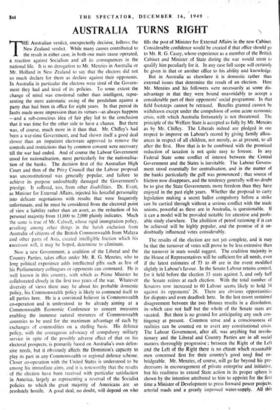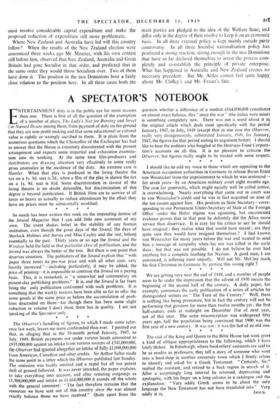AUSTRALIA TURNS RIGHT T IIE Australian verdict, unexpectedly decisive, follows the
New Zealand verdict. While many causes contributed to the result in either case, in both one main cause operated, a reaction against Socialism and all its consequences in the national life. It is no derogation to Mr. Menzies in Australia or Mr. Holland in New Zealand to say that the electors did not so much declare for them as declare against their opponents. In Australia in particular the electors were tired of the Govern- ment they had and tired of its policies. To some extent the change of mind was emotional rather than intelligent, repre- senting the mere automatic swing of the pendulum against a party that had been in office for eight years. In that period its faults made more impression than its virtues—as always happens —and a sub-conscious idea of fair play led to the conclusion that it was time for the other side to have a chance. But there was, of course, much more in it than that. Mr. Chifley's had been a war-time Government, and had shown itself a good deal slower than an impatient electorate approved to remove the controls and restrictions that by common consent were necessary till the war had ended. And of course the Labour Government stood for nationalisation, most particularly for the nationalisa- tion of the banks. The decision first of the Australian High Court and then of the Privy Council that the Labour proposal was unconstitutional was generally popular, and failure to achieve its purpose undoubtedly damaged the Government's prestige. It suffered, too, from other disabilities. Dr. Evatt, as Minister for External Affairs, injected his forceful personality into delicate negotiations with results that were frequently unfortunate, and he must be considered from the electoral point of view a liability rather than an asset, as the reduction of his personal majority from 11.000 to 2.000 plainly indicates. Much the same is true of Mr. Calwell, whose rigid immigration policy, resulting among other things in the harsh exclusion from Australia of citizens of the British Commonwealth from Malaya and other parts of Asia, created intelligible friction which his successor will, it may be hoped, determine to eliminate.
Now a new Government. a coalition of the Liberal and the Country Parties, takes office under Mr. R. G. Menzies, who to long political experience adds intellectual gifts such as few of his Parliamentary colleagues or opponents can command. He is well known in this country, with which as Prime Minister he collaborated closely in the first two years of the war. Whatever diversity of views there may be about his probable domestic policy, his Commonwealth policy is likely to commend itself to all parties here. He is a convinced believer in Commonwealth co-operation and is understood to be already aiming at a Commonwealth Economic Conference to concert measures enabling the immense natural resources of Commonwealth countries to be used for the maximum advantage of each by exchanges of commodities on a sterling basis. His defence policy, with the courageous advocacy of compulsory military service in spite of the possibly adverse effect of that on his electoral prospects. is primarily based on Australia's own defen- sive needs, but it obviously affects the Dominion's capacity to play its part in any Commonwealth or regional defence scheme. Closer co-operation with the United States is understood to be among his immediate aims, and it is noteworthy that the results of the election have been received with particular satisfaction in America, largely as representing a reversal of the Socialist policies to which the great majority of Americans are so resolutely hostile. A good deal, no doubt, will depend on who fills the post of Minister for External Affairs in the new Cabinet. Considerable confidence would be created if that office should go to Mr. R. G. Casey, whose experience as a member of the British Cabinet and Minister of State during the war would seem to qualify him peculiarly for it. In any case full scope will certainly be given in that or another office to his ability and knowledge.
But in Australia as elsewhere it is domestic rather than external issues that determine the result of an election. Here Mr. Menzies and his followers were necessarily at some dis- advantage in that they were bound unavoidably to accept a considerable part of their opponents' social programme. In that field footsteps cannot be retraced. Benefits granted cannot be withdrawn except under the compulsion of some acute economic.
crisis, with which Australia fortunately is not threatened. The principle of the Welfare State is accepted as fully by Mr. Menzies as by Mr. Chifley. The Liberals indeed are pledged in one respect to improve on Labour's record by giving family allow- ances in respect of all children, not merely, as at present, to all after the first. How that is to be combined with the promised reduction of taxation is not quite easy to foresee. In any Federal State some conflict of interest between the Central Government and the States is inevitable. The Labour Govern- ment stood essentially for centralisation, and in the matter of the banks particularly the gulf was pronounced ; that source of friction now disappears, and the tendency generally will no doubt be to give the State Governments more freedom than they have enjoyed in the past eight years. Whether the proposal to carry legislation making a secret ballot compulsory before a strike can be carried through without a serious conflict with the trade unions, powerful as these are in Australia, is questionable. If it can a model will be provided suitable for attentive and profit- able study elsewhere. The abolition of petrol rationing if it can be achieved will be highly popular, and the promise of it un- doubtedly influenced votes considerably.
The results of the election are not yet complete, and it may be that the turnover of votes will prove to be less extensive than the turnover in seats would suggest. The coalition majority in the House of Representatives will be sufficient for all needs, even if the latest estimates of 73 to 48 are in the event modified slightly in Labour's favour. In the Senate Labour retains control. for it held before the election 33 seats against 3, and only half the Senate retires at each election. With the total number of Senators now increased to 60 Labour seems likely to hold 34 against its opponents' 26. There are obvious opportunities for disputes and even deadlock here. In the last resort sustained disagreement between the two Houses results in a dissolution, in- which case not half but the whole of the Senate seats arc vacated. But there is no ground for anticipating any such con- tingency at present. Common sense and a consciousness of realities can be counted on to avert any constitutional crisis. The Labour Government, after all, was anything but revolu- tionary and the Liberal and Country Parties are in all social matters thoroughly progressive ; between the Right of the Left and the Left of the Right there is no chasm which reasonable men concerned first for their country's good neeil find un- bridgeable. Mr. Menzies, of course, will go far beyond his pre- decessors in encouragement of private enterprise and initiative, but his readiness to extend State action in its proper sphere is shown by the intention attributed to him to appoint for the first time a Minister of Development to press forward power projects, arterial roads and a greatly improved water-supply. All this must involve considerable capital expenditure and make the proposed reduction of expenditure still more problematic. Where New Zealand and Australia have led will this country follow? When the results of the New Zealand election were announced three weeks ago Mr. Menzies, with-his own contest still before him, obseived that New Zealand. Australia and Great Britain had gone Socialist in that order, and predicted that in the same order they would throw Socialism over. Two of them have done it. The position in the two Dominions bore a fairly close relation to the position here. In all three cases both the main parties are pledged to the idea of the Welfare State, and differ only in the degree of their resolve to keep it on an economic basis. In all three external policy is kept mainly outside party controversy. In all three Socialist nationalisation policy has produced a strong reaction, strong enough in the two Dominions that have so far declared themselves to arrest the process com- pletely and re-establish the principle of private enterprise. What has happened in Australia and New Zealand creates no necessary precedent. But Mr. Attlee cannot feel quite happy. about Mr. Chifley's and Mr. Fraser's fate.



































 Previous page
Previous page